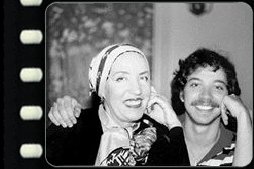.......An in depth interview with Tony nominated writer, Michael Korie... by Robb Brawn...
The positive energy that I've felt in creating this web site continues to flow and continues to inspire me to provide the Grey Gardens' fans with more. For this, the latest addition to the site, I once again had the privilege of interviewing one of the people I consider to be one of the major players in this ongoing saga called Grey Gardens. Michael Korie, along with his writing partner Scott Frankel was nominated for The Tony Award in 2007. Mr Korie was so very kind as to spend a good deal of time with me and put up with my long list of questions. I will admit I was a bit nervous, as I am quite in awe of his talent, but he made me feel very at ease right from the start. I was also VERY complimented to know that he really enjoys our web site.
Being a musician and songwriter myself, and being extremely familiar with the material, from both the off Broadway version and Broadway version, I hope that my line of questioning and this subsequent story will reflect a slightly different view than the reader has seen before.
The text in red between each paragraph are lines from the musical written by Michael Korie & Scott Frankel
PRELUDE
Both "Jersey Boys", Michael and I grew up just a few towns apart in New Jersey. Michael is from Teaneck, and we both graduated in 1973. Michael began his music studies as a young child, and during high school played violin in the orchestra and accompanied the choir on piano. In addition to piano, Michael has studied organ and harpsichord, spending a good deal of time on the latter. Although all are keyboard instruments, they require totally different playing techniques. Michael pointed out that with the harpsichord, "you are fairly limited to the type of music generally written for the instrument. " I am always interested in successful musician's early influences, so wanted to start there briefly. "Although I was studying classical piano, I was pretty open to all kinds of music. I did like rock, The Beatles, Springsteen, and Queen, and also Joni Mitchell and Carly Simon. I liked opera and I liked show music. I would listen to one particular record, over and over, every day for a year" Two of his favorites were Candide, which originally opened in 1956 with Barbara Cook, and A little Night Music, which not only won a Tony Award for Stephen Sondheim, but gave the pop music world "Send In The Clowns", which recorded by Judy Collns. charted on the Billboard Hot 100 in 1975 and then again in 1977. As to composers: "I like Cole Porter and Gershwin" I asked Michael what he listens to these days. "Not much. I have other stuff going on in my head and I really try not to get distracted "
"like a photo in a sterling silver frame..... what I wouldn't give to keep things just the same...."
Although Michael began to study music in college, he changed course and headed into journalism. He landed a job as editor in chief at New York Guide, with a large staff of reporters under him. "I got use to the power in that position, but had to give that up when I got into theater. " he said with a chuckle.
In his own words, Michael became "burnt out" with what he was doing. He had been writing songs, but found he preferred the melodic treatment of his lyrics when written by other composers over his own. Obviously, his background in journalism prepared him for writing in this new genre. "It's very useful in writing lyrics if you do have a musical background. If the lyrics are musical from inception, a composer can work well with them. Particularly in opera, you have a lot of poets doing the libretto and they don't always have the musical background" Michael had put music completely on hold for quite a long time. "I didn't think I could make music a career, and never thought of writing(music) for a living"
HARVEY MILK
".... to make a statement you need not be.... in Boston Harbor upending tea... and that's a revolution to me..."
A major foray back into the music world was an opera called Harvey Milk, in 1995. Michael wrote the libretto and composer, Stewart Wallace, the music. The opera was based on the openly gay, California politician, who was assassinated in 1978. The opera opened at the Houston Grand Opera and recorded on CD, conducted by Donald Runnieles with the San Francisco Opera Orchestra and Chorus.
Since both Harvey Milk and Grey Gardens were biographically based, I asked Michael how this earlier experience with Milk influenced/affected writing Grey Gardens. " It really helped. It was a big experiment and I loved writing it. It brought together many of my own interests too. I had the opportunity to interview many of his surviving friends, so I felt that I wasn't just writing libretto, but breaking news... information that really wasn't out there at the time....It prepared me for some of the negativity I'd face with Grey Gardens. With Harvey Milk, people would say "why are YOU doing this ! You're not even from San Francisco. We're not interested in your take on him...Actually, Scott (Frankel) was the one who got most of the crap at the beginning with Grey Gardens. He was living in Provincetown then, and people would just walk up to him on the street and say "How dare you !" Most of those type, ended up turning around. They had come to Playwrights with daggers out, just wanting to find fault, but most were converted after they realized our intentions were sincere.
CUE THE MUSIC !
"when you're alone and the twilight's glow shimmers across the bay.... drift away on a wave... drift away..."
"Grey Gardens was Scott's idea. He was walking down the street and a light bulb went off. It took about a year to figure out how to approach it. We watched it (the documentary) and watched it again, and thought... this is terrific, but no clue how we would do it." Michael explained he was a bit concerned. "I didn't want it to end up an opera." There was no real formula that they used. The pieces of the puzzle seemed to fit together rather slowly, sometimes one piece at time. "Doug Wright was interested in, but not committed to the project. One day, Scott and I went out to lunch to one of those places, you know, where they have paper table clothes and crayons. We were trying to come up with a structure that Doug could live with. Scott drew out with a crayon on the table cloth, two boxes. One is around the time the documentary was shot and the other in the past. We could do kind of a Philadelphia Story ". Michael still has this brain storming table cloth and will be giving it to the Lincoln Center Performing Arts Library along with other Grey Gardens memorabalia. "Doug loved the idea. " One question I really wanted to ask Mr Korie was how many times he'd actually watched the Documentary. "At least 100 times. We began writing down the dialog like a script, then we found out from Albert (Maysles) that it had already been transposed ! ... We didn't regret having done it. We knew it in our sleep. " At the beginning, the original documentary was their only real source, as The Beales of Grey Gardens had not yet been released. They later however, used " The Bouviers: Portrait Of An American Family as a good source. The book was written by Edie's cousin, John Davis. Much of the Major Bouvier character comes from information they learned from this book. As an aside if I may, Edie once told me that her cousin had " written this hideous book about the Bouviers. Everyting was wrong" Michael went on to say that Edie was aware though Albert Maysles of the plans for a musical. "We were planning on visiting her and then she passed away. It was Edie's own enthusiasm for music that made me think this could work. Edie was excited about the idea. Her last line to Albert Maysles was "It has to be historical".
Photo at top of page by Wendall Harrington: Michael Korie at rehearsals at the Walter Kerr Theatre.
Click PAGE 2 to continue.





























